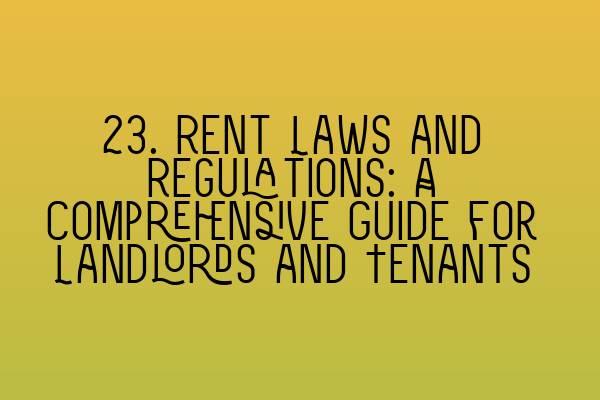23. Rent Laws and Regulations: A Comprehensive Guide for Landlords and Tenants
Introduction
Renting a property is a common practice in today’s society, and both landlords and tenants must navigate the complex world of rent laws and regulations. Understanding the legal framework is crucial for maintaining a fair and harmonious landlord-tenant relationship. In this comprehensive guide, we will explore the various aspects of rent laws and regulations, helping landlords and tenants alike to make informed decisions and protect their rights.
1. Understanding Rent Laws
Rent laws are designed to regulate the relationship between landlords and tenants, ensuring fairness and protecting the interests of both parties. Landlords must be aware of their responsibilities, while tenants must understand their rights and obligations. Familiarizing yourself with the relevant rent laws in your jurisdiction is the first step to ensuring a smooth and legally compliant tenancy.
2. Types of Tenancy
There are different types of tenancy agreements, such as assured shorthold tenancy (AST), regulated tenancy, and assured tenancy. Each type of agreement comes with its own set of rights and obligations for landlords and tenants. It is important to understand the type of tenancy you have in order to comply with the appropriate regulations and enjoy the corresponding legal protections.
3. Rent Increase Regulations
Landlords have the right to increase rent, but they must follow certain rules and procedures. In most jurisdictions, landlords must provide proper notice and cannot increase rent arbitrarily. Rent increase regulations vary, so it is essential to familiarize yourself with the specific rules in your area. This ensures that both landlords and tenants are treated fairly and prevents disputes.
4. Security Deposits
Security deposits are a common feature of tenancy agreements and serve as a form of protection for landlords against potential damages or unpaid rent. However, there are regulations governing the collection, handling, and return of security deposits. Landlords must adhere to these regulations to avoid legal repercussions. Tenants should also be aware of their rights regarding security deposits to ensure they are treated fairly.
5. Maintenance and Repairs
Landlords have a legal obligation to maintain and repair the property they are renting out. This means ensuring that the property is habitable and addressing any necessary repairs promptly. Tenants should report any maintenance issues to their landlord in a timely manner and keep a record of all communication. Understanding the maintenance and repair obligations helps prevent misunderstandings and ensures a safe and comfortable living environment.
6. Eviction Laws
Evicting a tenant is a serious matter and must be done in accordance with the law. Eviction laws vary from jurisdiction to jurisdiction, but generally, landlords must have a valid reason for eviction and follow proper legal procedures. Tenants also have rights in eviction proceedings and should seek legal advice if they believe they are being unfairly evicted. Understanding eviction laws is crucial for both landlords and tenants to protect their rights.
7. Rent Control
Rent control is a system implemented in some areas to regulate and limit rent increases. It aims to protect tenants from excessive or unfair rent hikes. Rent control laws vary widely, and some jurisdictions have stricter regulations than others. Landlords operating in rent-controlled areas must adhere to the established rent limits to remain compliant with the law.
8. Legal Resources and Support
Navigating the complexities of rent laws and regulations can be challenging, but you don’t have to do it alone. There are legal resources and support available to both landlords and tenants. Hiring a qualified solicitor who specializes in property law can be invaluable in ensuring compliance with rent laws and resolving any disputes that may arise. Additionally, there are courses and practice exams available to help prepare for those studying to become solicitors. The SQE 1 Practice Exam Questions and SQE 1 Practice Mocks FLK1 FLK2 provided by SQE Property Law & Land Law are great resources for solicitor aspirants.
Conclusion
Rent laws and regulations play a vital role in maintaining a fair and balanced relationship between landlords and tenants. By understanding these laws and the rights and obligations they entail, both landlords and tenants can avoid legal pitfalls and cultivate a positive renting experience. Whether you are a landlord or a tenant, staying informed about the ever-evolving landscape of rent laws is essential. Remember, seeking legal advice from a qualified solicitor is always a wise choice and can help protect your interests. For those preparing for the SQE exams, SQE 2 Preparation Courses and SQE 1 Preparation Courses offered by SQE Property Law & Land Law can provide the needed guidance. Stay informed, know your rights, and make informed decisions to ensure a successful tenancy experience.
